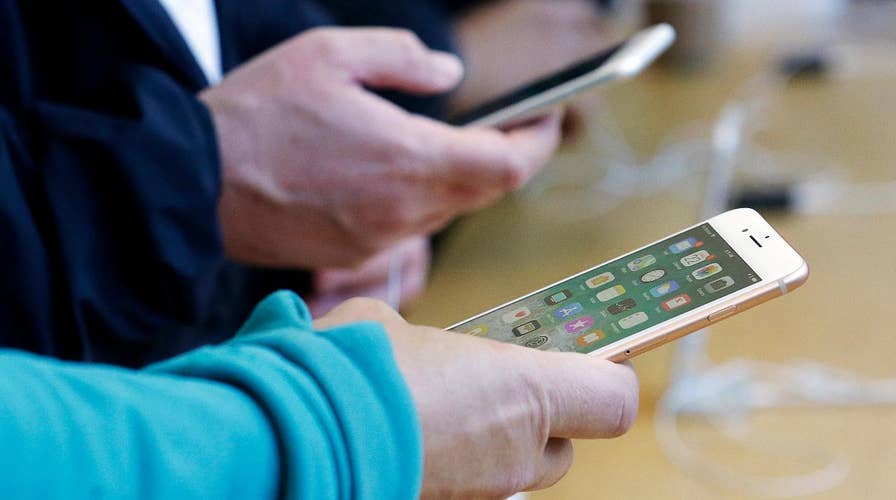The new cure for smartphone addiction: Buying a second phone
The CyberGuy Kurt Knutsson on the new cure for smartphone addiction and a new bill that would allow parents to erase children's information from certain services online.
According to a recent survey, over half of American children have smartphones by the time they’re 11-years-old – and 84 percent by the age of 13.
But is that a good idea? I don’t think so.
The proliferation of smartphones has fundamentally transformed adolescence for our nation’s youth in ways big and small.
SMARTPHONE SECURITY: WHAT’S BETTER TO USE A PIN, FACIAL RECOGNITION, OR YOUR FINGERPRINT?
Now, the culture will tell you it’s no big deal for a teen to have full access to a smartphone, or that it’s an absolute necessity for safety’s sake in this current cultural environment.
I beg to differ.
My wife and I have two boys – one now in college and the other a junior in high school. As president of a family-help organization and host of a national radio show dispensing practical advice, I’m regularly asked about the right age to allow your child to have their own phone.
I’ll tell you what I always say – “Hold off for as long as you can possibly hold out.”
In case you haven’t noticed, children don’t all mature at the same rate or in the same manner. My wife and I wound up waiting to give phones to our boys until they were 17 and 15, respectively. Yes, they voiced frustration from time to time, but it always passed rather quickly.
Technology seems to be evolving at the speed of sound. Resist the urge to check out and assume you know enough. From secret “photo vault” apps to seemingly innocuous terminology, it’s impossible for you to know what you don’t know.
By delaying giving them phones as long as we did, our boys avoided being caught up in the middle of numerous “texting” and other smartphone-related dramas within their circles of friends. They also avoided the inevitable distraction that accompanies every phone, regardless of how disciplined the user might be.
So, what age is best for you and your kids to cross the cellphone Rubicon? To help you determine exactly when the right time might be for you and your child, here is a three-point checklist:
Make sure your child knows how to reason and think
Our kids grow very weary very quickly when we lecture them. So, don’t just teach - ask questions that get him or her to think and apply their own mental reasoning and brakes about their use of technology. Help them think through the consequences of their choices.
Critical thinking isn’t just one of the keys to being responsible with a smartphone – it’s essential for long-term success in life.
Provide your kids with clear boundaries around technology use
During the teenage years, your son or daughter is less capable of long-term thinking, so they have less of a “braking system” when excitement and arousal occurs. As one of our organization’s counselors explained to me, that experience causes a surge of dopamine, a neurotransmitter, in the brain that in turn causes the child to get “hooked” on the use of the phone and pursue further risks in this area.
CLICK HERE TO GET THE OPINION NEWSLETTER
You can help your child avoid this chain reaction by limiting and filtering their access to smartphones and the Internet. For example, you can get your child a “dumb phone” – a phone that does nothing more than send and receive calls.
More from Opinion
You can require a phone to stay in your room overnight so you can review all the content daily and also help your teen avoid the temptation of texts in the wee hours of the morning. Parental controls exist to help you limit their texting and monitor their phone use.
Stay up-to-date with trends
Technology seems to be evolving at the speed of sound. Resist the urge to check out and assume you know enough. From secret “photo vault” apps to seemingly innocuous terminology, it’s impossible for you to know what you don’t know. Consider monitoring that apps your child puts on their device.
Today’s kids can hide their online actions from parents through the use of Internet acronyms. While we know “LOL” means “laughing out loud,” most moms and dads don’t realize “GNOC” means “get naked on camera” or “PIR” means “parent in room.”
CLICK HERE TO GET THE FOX NEWS APP
So, mom and dad, don’t rush the process or allow yourself to be pressured. But don’t fear technology either.
As it is, receiving text messages and calls from my sons is now one of the highlights of my day, proving that the same technology that can cause grief can also elicit joy if it’s managed responsibly.
CLICK HERE TO READ MORE FROM JIM DALY
**









































